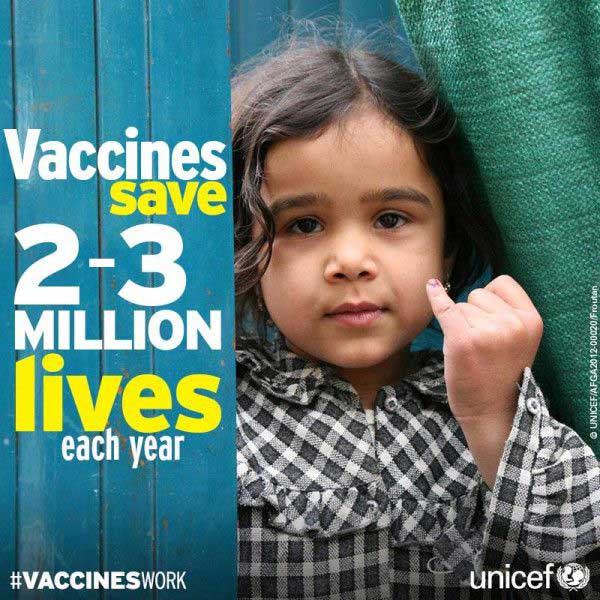
Vaccines save 20 million lives, $350 billion in poor countries since 2001
It is the one medical intervention that stands out from all others in a very positively and distinctly measurable way. Smallpox, which used to kill one out of every seven children is now gone. Polio has also now almost been totally eradicated. Any position that takes a stance against this is generally one that is contrary to what the available evidence reveals regarding the manner in which vaccines have utterly transformed humanity.
The Study
The new study published on the WHO website is this …
Estimated economic impact of vaccinations in 73 low- and middle- income countries, 2001–2020
The Objective of the study was as follows:
To estimate the economic impact likely to be achieved by efforts to vaccinate against 10 vaccine-preventable diseases between 2001 and 2020 in 73 low- and middle-income countries largely supported by Gavi, the Vaccine Alliance.
What exactly did they do?
They used health impact models to estimate the economic impact of achieving forecasted coverages for vaccination against Haemophilus in uenzae type b, hepatitis B, human papillomavirus, Japanese encephalitis, measles, Neisseria meningitidis serogroup A, rotavirus, rubella, Streptococcus pneumoniae and yellow fever. In comparison with no vaccination, they modelled the costs – expressed in 2010 United States dollars (US$) – of averted treatment, transportation costs, productivity losses of caregivers and productivity losses due to disability and death. They used the value-of-a-life-year method to estimate the broader economic and social value of living longer, in better health, as a result of immunization.
Conclusion
With the realisation that vaccines given between 2001 and 2020 will avert over 20 million deaths and save US$ 350 billion in cost of illness, the rather clear conclusion is that the impact of immunization goes well beyond health.
Who worked on this?
The listed authors is quite impressive and is as follows:
- Sachiko Ozawa – Division of Practice Advancement and Clinical Education, UNC Eshelman School of Pharmacy, University of North Carolina at Chapel Hill, CB # 7574, Beard Hall 115H, Chapel Hill, North Carolina, 27599, United States of America (USA).
- Samantha Clark – Department of International Health, Johns Hopkins Bloomberg School of Public Health, Baltimore, USA.
- Allison Portnoy – Department of Global Health and Population, Harvard TH Chan School of Public Health, Boston, USA
- Simrun Grewal – Department of Pharmacy, University of Washington, Seattle, USA.
- Meghan L Stack – Department of Global Health and Population, Harvard TH Chan School of Public Health, Boston, USA
- Anushua Sinha – Department of Preventive Medicine and Community Health, Rutgers New Jersey Medical School, Newark, USA.,
- Andrew Mirelman – Centre for Health Economics, University of York, York, England.
- Heather Franklin – Department of Preventive Medicine and Community Health, Rutgers New Jersey Medical School, Newark, USA.
- Ingrid K Friberg – Department of Health Services, Norwegian Institute of Public Health, Oslo, Norway.,
- Yvonne Tam – Department of International Health, Johns Hopkins Bloomberg School of Public Health, Baltimore, USA.
- Neff Walker – Department of International Health, Johns Hopkins Bloomberg School of Public Health, Baltimore, USA.
- Andrew Clark – Department of Health Services Research and Policy, London School of Hygiene & Tropical Medicine, London, England.
- Matthew Ferrari – Center for Infectious Disease Dynamics, The Pennsylvania State University, University Park, USA.
- Chutima Suraratdecha – Independent Consultant, Vienna, USA.
- Steven Sweet – Center for Health Decision Science, Harvard TH Chan School of Public Health, Boston, USA.
- Sue J Goldie – Center for Health Decision Science, Harvard TH Chan School of Public Health, Boston, USA.
- Tini Garske – MRC Centre for Outbreak Analysis and Modelling, Imperial College London, London, England
- Michelle Li – Gavi, the Vaccine Alliance, Geneva, Switzerland.
- Peter M Hansen – The Global Fund to Fight AIDS, Tuberculosis and Malaria, Geneva, Switzerland.
- Hope L Johnson – Gavi, the Vaccine Alliance, Geneva, Switzerland.
- Damian Walker – Bill & Melinda Gates Foundation, Seattle, USA
Lead Research Observations
Sachiko Ozawa, the lead researcher …
“Vaccination is generally regarded to be one of the most cost–effective interventions in public health, Decision-makers need to appreciate the full potential economic benefits that are likely to result from the introduction and sustained use of any vaccine or vaccination program.”
“Our examination of the broader economic and social value of vaccines illustrates the substantial gains associated with vaccination, Unlike previous estimates that only examine the averted costs of treatment, our estimates of the broader economic and social value of vaccines reflect the intrinsic value that people place on living longer and healthier lives.”
The Anti-Vaccine Movement
The anti-vaccine movement is basically using emotional manipulation and has no evidence of any real substance to the claims they promote. It is true that there exists a possibility of a very rare adverse reaction, but the benefits that vaccinations bring are deeply profound and many orders of magnitude far more beneficial.
Literally millions of lives are being saved, and that is just since 2001. As a contrast, the anti-vaccine movement quite literally has a body count associated with it.